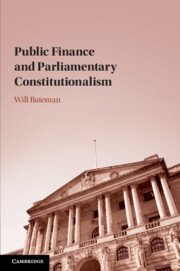Book contents
- Public Finance and Parliamentary Constitutionalism
- Public Finance and Parliamentary Constitutionalism
- Copyright page
- Dedication
- Contents
- Figures
- Preface
- Acknowledgements
- Notes on the Text
- Abbreviations
- 1 Finance and Constitutionalism
- Part I Historical Development of Parliamentary Public Finance
- Part II Parliamentary Public Finance in Operation
- 6 Fiscal Authority
- 7 Debt and Monetary Authority
- 8 Judicial Power
- Part III Evaluating Parliamentary Public Finance
- Bibliography
- Index
8 - Judicial Power
from Part II - Parliamentary Public Finance in Operation
Published online by Cambridge University Press: 16 September 2020
- Public Finance and Parliamentary Constitutionalism
- Public Finance and Parliamentary Constitutionalism
- Copyright page
- Dedication
- Contents
- Figures
- Preface
- Acknowledgements
- Notes on the Text
- Abbreviations
- 1 Finance and Constitutionalism
- Part I Historical Development of Parliamentary Public Finance
- Part II Parliamentary Public Finance in Operation
- 6 Fiscal Authority
- 7 Debt and Monetary Authority
- 8 Judicial Power
- Part III Evaluating Parliamentary Public Finance
- Bibliography
- Index
Summary
This chapter evaluates the limited function of common law judiciaries in public finance by reference to UK and Australian case studies. It opens by observing and explaining the asymmetrical involvement of judiciaries in public finance law: why disputes concerning tax legislation are more justiciable than disputes concerning appropriation, debt and monetary finance. The chapter then analyses the only modern attempt by a common law judiciary to expand its involvement in disputes concerning public expenditure, Williams v The Commonwealth of Australia, and its aftermath. That Australian case study neatly illustrates the judiciary's inability to effect a meaningful re-distribution of financial authority away from treasury departments and towards parliaments. The chapter then examines the problems with understanding common law courts as systemically reliable mechanisms to enforce parliamentary authority over taxation by reference to the UK judiciary's tax law and tax agency practice. The chapter concludes that the presence of judicial power does not substantially impact the distribution of financial authority between executive governments and parliaments.
Keywords
- Type
- Chapter
- Information
- Public Finance and Parliamentary Constitutionalism , pp. 171 - 196Publisher: Cambridge University PressPrint publication year: 2020

